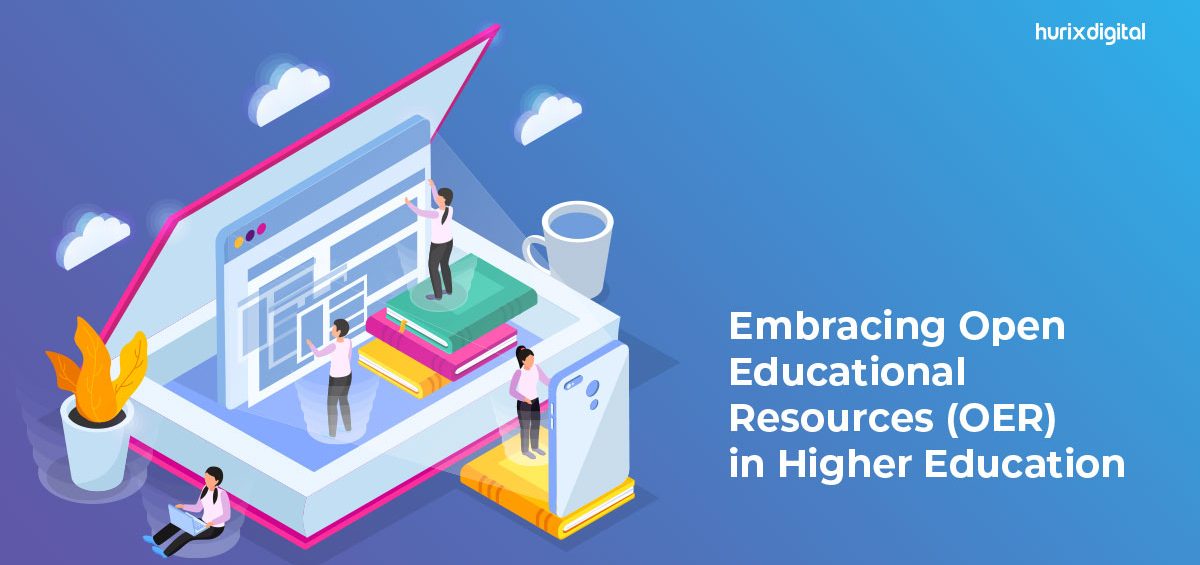Summary
This article provides an overview of the importance of OERs in higher education. It also discusses the benefits of OERs and how they can be used in the higher education sector.
The educational landscape is ever-evolving, and one concept that is changing the field in numerous ways is that of Open Educational Resources (OERs). In the education sector, especially when it comes to e-Learning in higher education, OERs have a pivotal role to play.
They are gaining increasing importance in the context of the open education movement and open educational practices. OERs are powerful means of driving teacher collaboration and professional development. They can enhance the knowledge of technology in the higher education landscape.
Table of Contents:
- What Are Open Educational Resources (OERs)?
- What Is the Importance of Open Educational Resources (OERs) in Higher Education?
- How to Create Open Educational Resources (OERs)
- Benefits of Implementing an Open Educational Strategy
- Closing Thoughts
What are Open Educational Resources (OERs)?
Open Educational Resources (OERs) refer to any content, printed or online, that is freely available to students and instructors without needing payment or license. These can include teaching, learning, and research materials in any medium and format.
OERs are released under an open license and can be reused, re-purposed, adapted, and redistributed by others at no cost. The main purpose behind OERs is to reduce accessibility barriers, promote better teaching practices, and provide an enhanced educational paradigm. In the era of digital learning, OERs in higher education are becoming more and more prevalent.
What is the Importance of Open Educational Resources (OERs) in Higher Education?
OERs broaden participation in educational programs by removing geographical barriers and making educational materials more accessible to people. OERs can include an extensive range of online materials, including classroom activities, quizzes, open textbooks, multimedia applications, course modules, etc.
Open education offers multiple ways of teaching, customizing, learning, and sharing knowledge. It makes it possible to reduce the cost of education and make higher education more affordable to the masses. These resources also allow learners to access open textbooks and other learning materials from anywhere.
This feature is particularly useful for learners with other obligations, such as family responsibilities and jobs. Open education has great potential to make higher education more accessible and affordable for students worldwide.
There is a belief in the higher education sector that information should be available freely for students to use and knowledge-sharing should be a collaborative process. Educators and learners should be encouraged to actively embrace the open education movement and focus on creating OERs to integrate digital resources into education.
These educational resources must be published in revisable, easy-to-use formats to support seamless knowledge sharing. One of the major goals of open education is to inspire governments, universities, colleges, and school boards to prioritize OERs.
Eliminating barriers to education, such as geographical limits, the high cost of tuition fees and study materials, and legal mechanisms that challenge collaboration among instructors, is important. To promote better education for all, building a foundation that supports the free sharing of new information is necessary.
Also Read: What are the Biggest Challenges of Online Education Today?
How to Create Open Educational Resources (OERs)
Creating OERs follows the same process as creating other instructional materials. The only difference is that OERs have an open license attached that allows them to be shared freely. There are three main ways to create OERs.
1. Create a New Resource from Scratch
Instructors and educators can create new OERs from scratch. OERs are created the same way other educational materials are produced. However, to make an educational resource an OER. One has to attach an open license to the final product.
2. Assign an Open License to Already Created Resources
Many educators create educational content through slides, presentations, handouts, etc. They can convert such content pieces into OERs by assigning an open license to them. While educators have the right to make their content free for use by the public, they should take care not to infringe the copyrights of other authors. Copyrighted works cannot be assigned free licenses by anyone other than the original authors.
3. Customizing Existing OERs
Educators who are unable to create their OERs can take existing materials with open licenses and change them to meet the needs of their students. They can curate content from different open sources, update an existing resource with new information, edit or modify existing OERs to suit their specific class, or combine multiple open resources to create a new resource. This option allows educators to customize content for the courses they teach.
Benefits of Implementing an Open Educational Strategy
Implementing an open educational strategy partially or fully in your organization can offer multiple benefits to students.
1. Improved Accessibility
OERs make education more accessible to students. OERs come in various formats, including text, audio, video, and multimedia, which help address different learning styles and disabilities. Anyone who can access the internet can access these educational resources.
2. Affordable Education for Students
Using OERs makes it easier for students from economically underprivileged backgrounds to pursue higher education. Such students may not be able to afford formal college education otherwise.
3. Lifelong Access
Students have lifelong access to the OERs in an open education system. Unlike textbooks that have to be physically carried from place to place, online OERs and e-books are easily accessible anywhere. Students can still access their course materials irrespective of location, and they won’t lose any valuable study material due to moving from one place to another.
4. No Copyright Concerns
OERs are, by default, open to the public. Thus, instructors can use these resources and share them with their colleagues, students, and other stakeholders without any fear of copyright concerns.
Also Read: Customized Learning Experiences: Personalizing Education with Educational Video Games in K12
Closing Thoughts
The open education movement is a new one that is increasingly gaining significance. Institutions that adopt OERs in higher education will play a pivotal role in making education more accessible to the masses.
The movement continues to grow in popularity as more and more educational institutions all over the globe are embracing OERs. Are you planning to join the growing open education revolution?
Working with a trusted educational solutions provider like Hurix Digital will not only give you the head start you need but ensure that your institution can create a consistent, meaningful experience for learners. Get in touch with our experts today to explore how Hurix Digital can help you!







